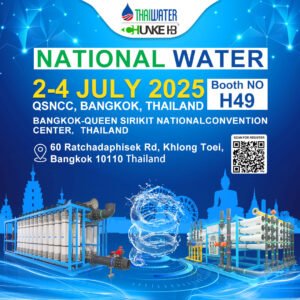Reverse Osmosis & Water Treatment in United Arab Emirates
CHUNKE projects of Reverse Osmosis Water Treatment in United Arab Emirates including different types of water treatment systems.
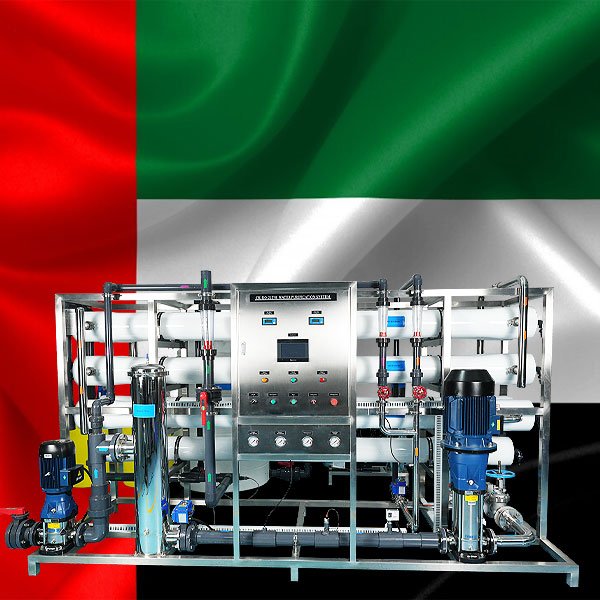
The United Arab Emirates is a country in West Asia. It is located at the eastern end of the Arabian Peninsula and shares borders with Oman and Saudi Arabia. While having maritime borders in the Persian Gulf with Qatar and Iran. Abu Dhabi is the nation’s capital, while Dubai, the most populous city, is an international hub.
The United Arab Emirates is an elective monarchy formed from a federation of seven emirates. It is consisting of Abu Dhabi (the capital), Ajman, Dubai, Fujairah, Ras Al Khaimah, Sharjah and Umm Al Quwain. Each emirate is governed by a ruler and together the rulers form the Federal Supreme Council. The members of the Federal Supreme Council elect a president (as of 14 May 2023, Sheikh Mohamed bin Zayed Al Nahyan) and vice president (Sheikh Mohammed bin Rashid Al Maktoum and Sheikh Mansour bin Zayed Al Nahyan) from among their members. In practice, the ruler of Abu Dhabi serves as president while the ruler of Dubai is vice president and prime minister. In 2013, the country had a population of 9.2 million, of which 1.4 million were Emirati citizens and 7.8 million were expatriates. As of 2023, the United Arab Emirates has an estimated population of roughly 10.2 million.
Total Renewable Water Resources per Capita in United Arab Emirates
In 2020, renewable water resources per capita for United Arab Emirates was 15.2 cubic meters per year. Renewable water resources per capita of United Arab Emirates fell gradually from 540.6 cubic meters per year in 1971 to 15.2 cubic meters per year in 2020.
Renewable surface water: 0.1 billion cubic meters per year
Renewable groundwater: 0.1 billion cubic meters per year
Renewable water resources: 0.1 billion cubic meters per year
Meanwhile, CHUNKE provides wide range of filtration and economical solutions based on the United Arab Emirates’ water resources. So, our water treatment in United Arab Emirates becomes more popular accordingly.
- Surface water is water from river, lake which can be treated using different methods, such as Ultrafiltration Systems, Brackish Water RO accordingly.
- Desalination can be used for water from ocean, or sea source, which can be treated using Sea Water Reverse Osmosis Systems; Desalination Systems
- Ground Water or brackish water is from water located in the pore space of soil and rock “Borehole well”, which can be treated using Reverse Osmosis Systems, Borehole Water Filtration Systems, Well Water Filtration Systems, Chemical Dosing, UV Water Sterilizer accordingly.
- Government water supply, which could have high level of hardness or high level of chlorine, can be treated with Water Softener System, Media Water Filters.
CHUNKE Projects of Water Treatment in United Arab Emirates
Meanwhile, CHUNKE designs and produces water treatment systems that meet the World Health Organization requirements. So, our water treatment in United Arab Emirates is suitable for drinking.
CHUNKE has over 15 years of experience as a global provider of B2B water treatment solutions for a variety of applications and industries. Hence, we offer a large selection of all types of reverse osmosis, ultrafiltration, electrodeionization. And also, water treatment systems to meet your industrial needs accordingly. So, CHUNKE’s extensive global experience in engineering. And manufacturing allows us to pre-engineer and customize water treatment and reverse osmosis systems to meet a wide range of customer requirements and specifications.
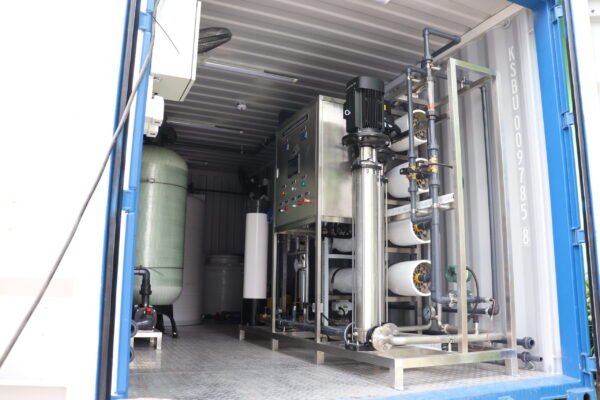
8TPH Mobile Containerized Brackish RO Plant
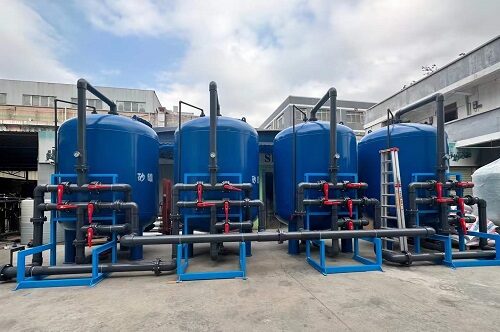
60TPH Water Filtration System for Irrigation
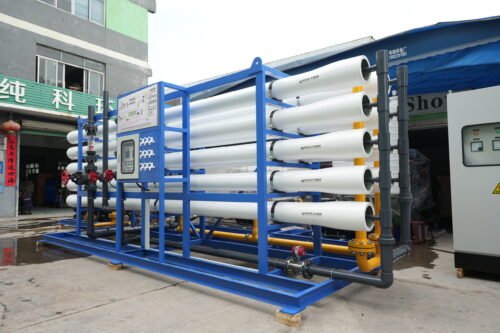
40TPH Sea Water Desalination Plant for Irrigation
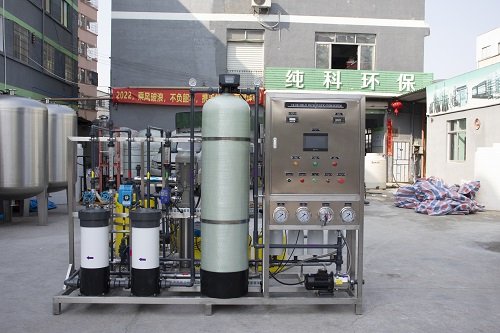
500LPH RO Sea Water Desalination for Irrigation
Water Treatment in United Arab Emirates: A Comprehensive Overview
Water is a precious resource, and nowhere is this more evident than in the United Arab Emirates (UAE). Hence, located in the Middle East, the UAE faces unique challenges when it comes to water scarcity and quality. So, in this article, we will explore the various methods and technologies used for water treatment in the UAE, with a specific focus on the use of reverse osmosis systems.
The Importance of Water Treatment in the UAE
The UAE, composed of seven emirates, including Abu Dhabi, Dubai, and Sharjah, is known for its vast reserves of oil and natural gas. However, when it comes to freshwater resources, the country faces significant challenges. So, the UAE is situated in a region with limited rainfall and is surrounded by the Gulf of Oman and the Arabian Gulf. So, this scarcity of freshwater necessitates the use of innovative water treatment methods to meet the growing demand for clean water.
Environmental Challenges
Before we delve into the specifics of water treatment in the UAE, it is essential to understand the environmental challenges the country faces. So, these challenges include:
- Lack of Natural Freshwater Resources: The UAE compensates for the lack of natural freshwater resources through the use of desalination plants. So, these plants play a crucial role in providing clean water to the population.
- Desertification: Like many other arid regions, the UAE is susceptible to desertification, which is the degradation of land due to various factors such as climate change and human activities. So, this poses a threat to the availability of water resources.
- Beach Pollution from Oil Spills: The UAE’s reliance on oil and gas production makes it vulnerable to oil spills, which can have severe consequences for the marine ecosystem and water quality.
- Sand and Dust Storms: The UAE experiences frequent sand and dust storms, which further impact the quality of air and water resources.
Water Resources in the UAE
To understand the water treatment methods employed in the UAE, it is essential to have a clear picture of the available water resources. Here are some key statistics, acordingly:
- Total Renewable Water Resources: In 1997, the UAE had a total renewable water resource of 0.2 cubic kilometers.
- Freshwater Withdrawal: The annual freshwater withdrawal in the UAE amounts to approximately 2.3 cubic kilometers, with 23% allocated for domestic use, 9% for industrial use, and 68% for agricultural purposes.
- Per Capita Freshwater Withdrawal: The per capita freshwater withdrawal in the UAE is relatively high due to the country’s water-intensive industries and agricultural practices.
It is crucial to note that the UAE heavily relies on groundwater abstraction to meet its freshwater needs. However, over-extraction of groundwater resources has led to a lowering of the water table and increased seawater intrusion in coastal areas.
Reverse Osmosis: A Game-Changer in Water Treatment in United Arab Emirates
One of the most effective and widely used methods of water treatment in the UAE is reverse osmosis (RO). So, reverse osmosis is a process that involves the passage of a solvent, usually water, through a semipermeable membrane to remove dissolved impurities and contaminants. Hence, this technology has revolutionized water treatment in the UAE, particularly in desalination plants.
How Reverse Osmosis Works
Reverse osmosis works by applying pressure greater than the osmotic pressure to force water molecules through the membrane, while leaving behind the majority of dissolved salts, organics, bacteria, and pyrogens. So, the result is pure water that is free from most contaminants.
Advantages and Limitations of Reverse Osmosis
Reverse osmosis offers several advantages in water treatment:
- Effective Removal of Contaminants: Reverse osmosis systems can remove a wide range of contaminants, including bacteria, viruses, dissolved salts, and organic compounds.
- Compact and Modular Design: RO systems are compact and modular, making them suitable for various applications, from domestic use to large-scale industrial operations.
- Customizable to Specific Needs: RO systems can be customized to meet specific water quality requirements, allowing for targeted treatment.
However, it is crucial to consider the limitations of reverse osmosis: - Removal of Healthy Minerals: Reverse osmosis systems also remove essential minerals from water, such as calcium, magnesium, and potassium. This can result in water that is more acidic and lacks beneficial minerals.
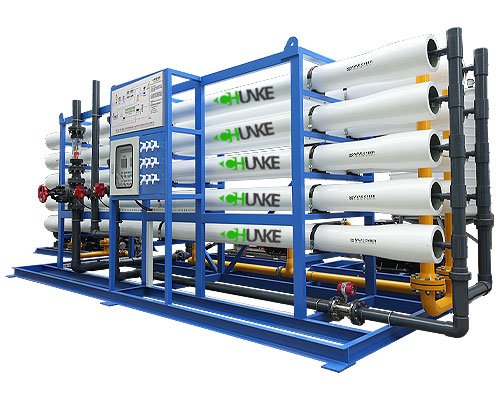
Reverse Osmosis Systems in the UAE
The UAE has embraced reverse osmosis technology to address its water treatment needs. Hence, the country boasts a significant number of RO plants and systems, catering to various sectors and applications. So, some notable applications of reverse osmosis in the UAE include:
- Desalination Plants: Desalination plants play a critical role in providing freshwater to the UAE by removing salt and other impurities from seawater through the process of reverse osmosis.
- Industrial Water Treatment: RO systems are widely used in industries such as power generation, pharmaceutical production, and food and beverage processing. These industries require high-quality water for their operations, and reverse osmosis provides an effective solution.
- Domestic Water Purification: Many households in the UAE rely on reverse osmosis systems for their daily water needs. These systems ensure the availability of clean, safe drinking water.
RO Plants in the UAE
RO plants play a vital role in addressing the water treatment needs of the UAE. So, these plants are designed to handle large volumes of water and employ various processes to ensure optimal purification. Some key features of RO plants in the UAE include, accordingly:
- Intake Pre-treatment: The water undergoes pre-treatment processes to remove larger particles, sediments, and impurities before entering the reverse osmosis system.
- High-Pressure Pump: A high-pressure pump is used to overcome the osmotic pressure and push the water through the reverse osmosis membrane.
- Membrane Assembly: The heart of the RO plant is the membrane assembly, which consists of semipermeable membranes that selectively allow water molecules to pass through while rejecting contaminants.
- pH Adjustment: To ensure the water’s pH is within the desired range, pH adjustment processes may be employed.
- Disinfection: After the reverse osmosis process, the water may undergo disinfection to eliminate any remaining microorganisms.
These features, among others, contribute to the efficient and effective operation of RO plants in the UAE.
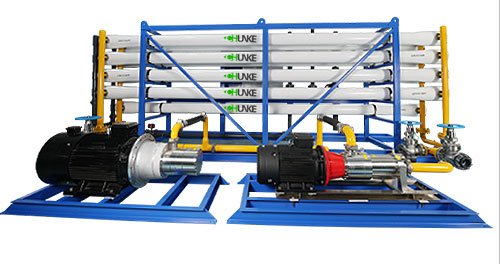
The Future of Water Treatment in the UAE
As the UAE continues to face water scarcity and environmental challenges, the development of innovative water treatment technologies is crucial. The government and various organizations are actively investing in research and development to enhance water treatment methods. It improves efficiency, and promote sustainability.
One area of focus is the integration of renewable energy sources, such as solar power, into water treatment processes. This approach reduces reliance on fossil fuels, minimizes carbon emissions, and contributes to a greener and more sustainable future.
Water treatment in the United Arab Emirates is a complex and multifaceted endeavor. The country’s unique environmental challenges and limited freshwater resources necessitate the use of advanced technologies, such as reverse osmosis systems, to ensure the availability of clean water.
Reverse osmosis has emerged as a game-changer in water treatment, enabling the UAE to meet its growing water demands. These systems are used in desalination plants, industrial operations, and domestic settings, providing high-quality water for various applications.
As the UAE looks towards the future, continued investment in research, development, and sustainable practices will be vital to ensure the long-term availability of clean water for its population. Through innovation and collaboration, the UAE can overcome its water challenges and pave the way for a more water-secure future.
Chunke Water Treatment‘s expertise in producing high-quality reverse osmosis systems has contributed to improving water treatment capabilities in United Arab Emirates. So, their reliable and efficient RO plants have been implemented in various projects across the country, ensuring access to clean and safe drinking water.

